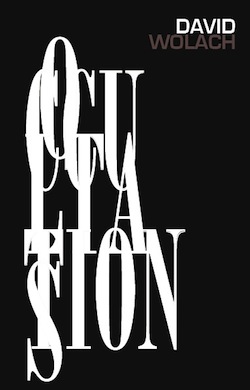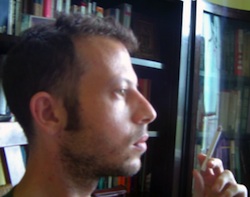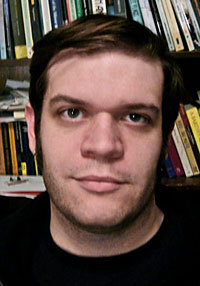
| Jacket 40 — Late 2010 | Jacket 40 Contents | Jacket Homepage | Search Jacket |
This piece is about 3 printed pages long.
It is copyright © Matthew Landis and Jacket magazine 2010. See our [»»] Copyright notice.
The Internet address of this page is http://jacketmagazine.com/40/r-wolach-rb-landis.shtml
David Wolach
Occultations
reviewed by
Matthew Landis
Black Radish Books, 2010, pp 168, paper, isbn 9780982573129, $15.00

1
David Wolach’s new book, Occultations, attempts to provide a record for the decay of two bodies: the social body and his own. Written while suffering the effects of a neuromuscular illness which resulted in what Wolach describes as a “subtle loss in motor function which followed a sudden loss of balance”, the book charts the topographies of two types of disease. The first is, of course, the disease which Wolach suffers from and more generally, how disease effects our perception of the body. Embodiedness is a persistent marker throughout the book, not only topically but procedurally: from the “fire ritual” of the first poem in the book — which calls for “marking the body” with the ashes of the author(s)’ burnt poetry — to the “exploration” of various techniques (stress positions, use of food in torture, etc) in the CIA’s torture memorandum in the “distraction zone stagings” (from the section entitled “your nerve center taxonomy”). Secondly, Wolach is examining the effects of ritual and social decay on the body (“necrosis from spine to peripheries is an imaginary/colonial book of recipes.”). Wolach’s use of the CIA torture memo also highlights the ways in which surveillance culture and torture treat the body as an object of power (to paraphrase Foucault) and how these methods effect not just our physical but mental realities (“Misery we call a particular logic”). Pornography, medicine, voyeurism, food, spy-craft, media, and police surveillance all populate Wolach’s complex documentation and diagnosis of the sicknesses of war and exploitation.

David Wolach
2
The commingling of Wolach’s experiences of bodily and social degeneration are the primary impetus behind the book and the most simple way of describing what Occultations strives to understand. The real pleasure of Occultations lies in discovering the various ways in which Wolach illustrates this. He uses procedural techniques, especially somatics, with great facility (again, the “distraction zone stagings” are striking examples of this). Wolach’s typographical choices are effective markers of shifts in tone and theme: for example, deploying Helvetica in one section as a “commercial / ‘neutralizing’ typeface”. This typographical sensitivity as well as his use of visuals provide a shifting contextualization of Wolach’s superb grasp of scoring speech and lyric intensity; e.g, “modular arterial cacophony” lays poetry on top of leaked government and law enforcement documents and “book alter(ed)” juxtaposes photographs of Wolach’s own body with poems, shifting between erotic intimacy and political rumination.
3
Wolach’s thoughts regarding illness and his political convictions will be clear to the reader. His poetic process is also lucidly and compellingly catalogued in his notes. However, I found myself wishing, at times, that Wolach’s process was not so clearly detailed. Wolach explains all of his various procedures and realms of inquiry in the notes at the end of the book as well as the directions he supplies for his “distraction zone stagings”. All of this information is invaluable in deciphering the various technical, personal, and political layers that Wolach’s poems encompass.
4
For the more performative works such as the “fire ritual” (which Wolach openly encourages others to perform), the notes and “stage directions” are necessary and helpful because they are scripting the work for a performer. And while it is true that in almost every case, the explanations do assist the reader in grasping the poems at a deeper level, they also limit the reader’s ability to engage with the powerful and innovative book that Wolach has written. It is difficult to participate in the creation of meaning in a poem when so much of the meaning-bearing material that fashioned the work has been laid bare.
5
Wolach is savvy enough to save the notes section for the end of the book; however, once I read them , my reflections on the book immediately shifted away from attempting to have a dialogue with this wonderful work and began a series of cerebral machinations. The notes functioned as encouragement to perform a sort of poetic reverse engineering by trying to piece together the evolution of the poem from the procedural and theoretical notes Wolach provides.
6
This was my sole reservation about the book and, I confess, it borders on the inconsequential. David Wolach’s Occultations does a remarkable job of exploring the connection between the personal and the social, highlighting the similarities between our collective experience of catastrophic social ills and our own personal catastrophes — our afflictions and illnesses. The result of Wolach’s exploration is a rather remarkable thing: an experimental and vital book of “confessional” and “topical” poetry that will prove to be an important contribution to contemporary posthuman(ist) writing.

Matthew Landis
Matthew Landis is a poet, musician, and songwriter from the Philadelphia area. He is a graduate of the University of Pennsylvania’s MLA program, where he studied poetry/poetics & critical theory. He participated in Tan Lin ‘s EDIT Series event centered around his Seven Controlled Vocabularies and Obituary 2004. The Joy of Cooking at the Kelly Writer’s House. Matthew worked as one of the editors on one of the many companion publications produced for the EDIT series event, the collection entitled Selected Essays About a Bibliography (which are available on Lulu.com & forthcoming in print). Matthew’s first, self published chapbook Like a Moth from His Dead Mouth was recently released and his poems & essays have appeared or will be appearing online/in-print in places such as Critiphoria, Try, Literary Kicks, & The Apiary Corporation. He is a member of the New Philadelphia Poets and runs the Jubilant Thicket reading series with Debrah Morkun & Sarah Heady. A longtime professional musician, Matthew has toured Europe and the Northeast U.S. extensively as a keyboardist for Brooklyn cabaret-circus-punk band The World/Inferno Friendship Society. Matthew is also finishing up work at Turtle Studios in Philadelphia on his first full-length record. It will be out this fall.